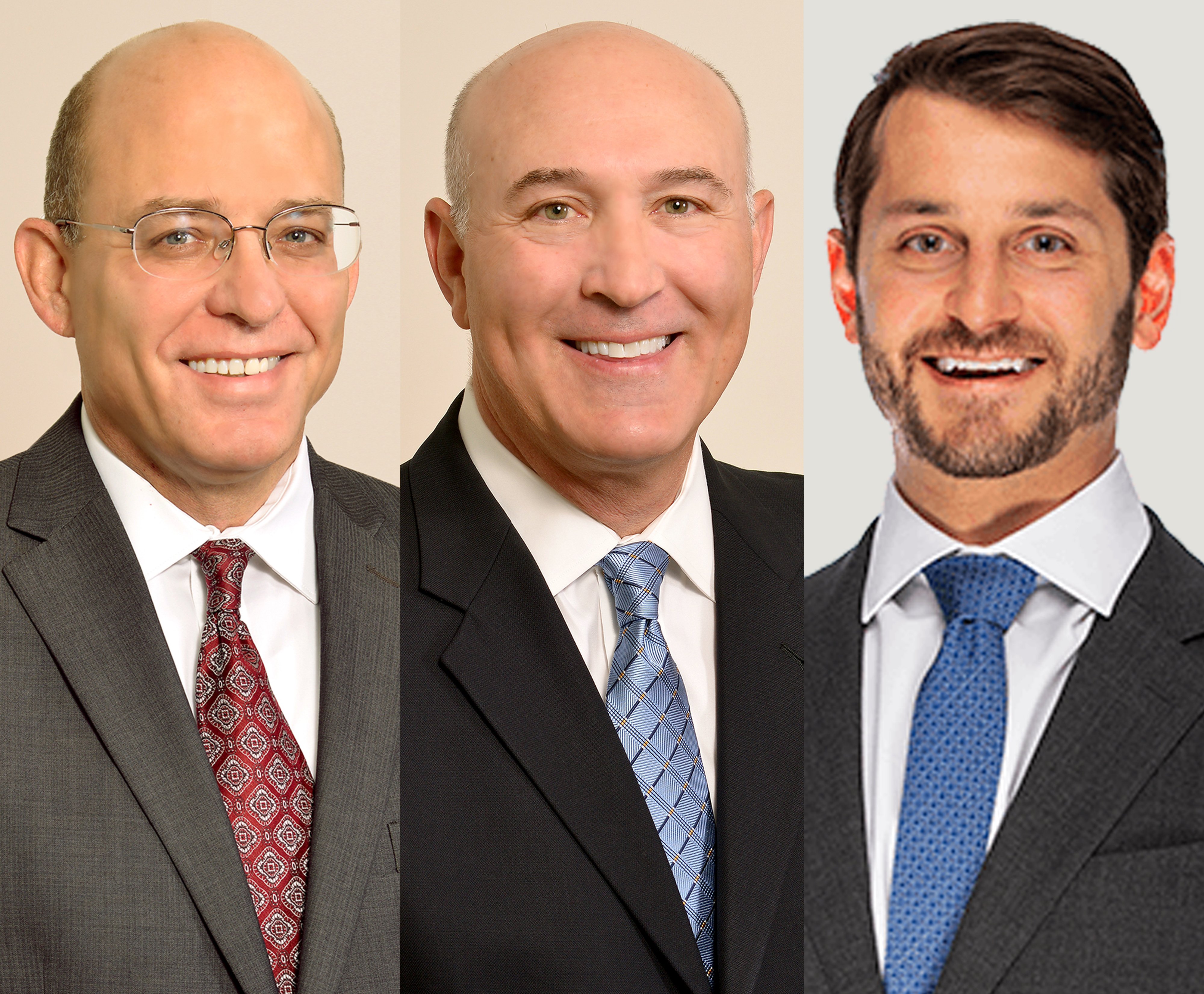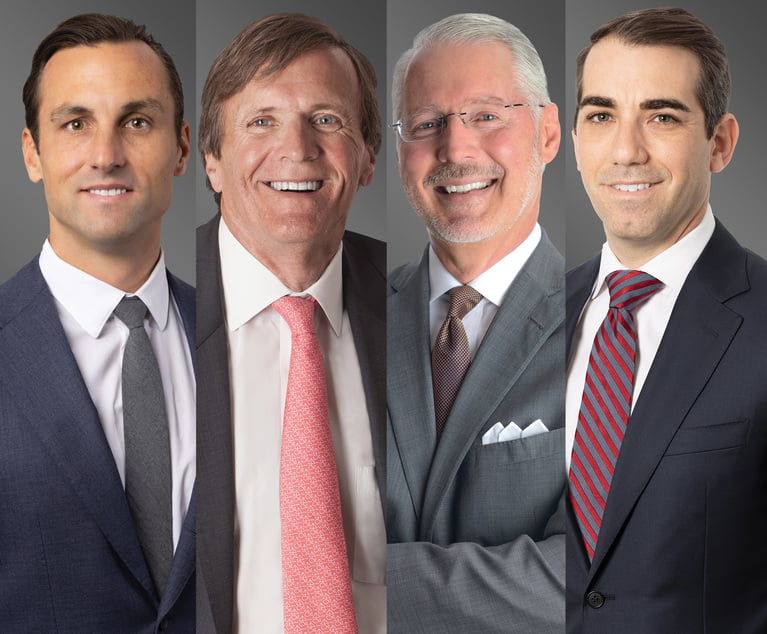Tobacco Industry Gets Win at Supreme Court
Siding with R.J. Reynolds Tobacco Co., the Supreme Court said plaintiffs must show that smokers relied on misleading information from cigarette makers to prevail on the claims.
March 18, 2022 at 10:27 AM
4 minute read
 Bottom row (l-r): Justice Ricky Polston, Chief Justice Charles T. Canady, Justice Jorge Labarga. Top row (l-r): Justice John D. Couriel, Justice Alan Lawson, Justice Carlos G. Muñiz, Justice Jamie R. Grosshans.
Bottom row (l-r): Justice Ricky Polston, Chief Justice Charles T. Canady, Justice Jorge Labarga. Top row (l-r): Justice John D. Couriel, Justice Alan Lawson, Justice Carlos G. Muñiz, Justice Jamie R. Grosshans.
In what a dissenting justice called a "fundamental shift," the Florida Supreme Court on Thursday issued a ruling that likely will make it harder for many plaintiffs suing tobacco companies about smoking-related illnesses.
The 6-1 ruling dealt with plaintiffs in a large group of cases — known as "Engle progeny" cases — and claims that tobacco companies fraudulently concealed or conspired to conceal information about the health effects and addictiveness of smoking.
Siding with R.J. Reynolds Tobacco Co., the Supreme Court said plaintiffs must show that smokers relied on misleading information from cigarette makers to prevail on the claims.
"(What) matters for purposes of reliance is that the plaintiff be able to prove a causal connection running from an Engle defendant's statement or statements, to the plaintiff's beliefs about the health effects or addictiveness of smoking cigarettes, to the plaintiff's injury," said the 25-page majority opinion, written by Justice Carlos Muniz and joined by Chief Justice Charles Canady and Justices Ricky Polston, Alan Lawson, John Couriel and Jamie Grosshans. "The statements relied upon must have been capable of causing the plaintiff to form a false belief about the health effects or addictiveness of smoking cigarettes."
But Justice Jorge Labarga, in a 14-page dissent, said the majority opinion disturbs "settled law regarding Engle progeny litigation and injects uncertainty into the remaining Engle progeny cases." He called it a "fundamental shift in this court's jurisprudence."
"Until today, it was settled law in Florida that a jury in an Engle progeny case was permitted to infer reliance based upon evidence of the smoker's own history coupled with the tobacco industry's pervasive advertising and creation of a false controversy about the risks of smoking, without the necessity of proving that the smoker relied on any specific statement by tobacco companies," Labarga wrote.
The ruling came in a case involving John C. Price, who started smoking at age 12 and died at age 74 of chronic obstructive pulmonary disease. A Duval County jury awarded $6.4 million in compensatory damages to Price's estate in an Engle progeny case against R.J. Reynolds.
But a panel of the 1st District Court of Appeal in 2019 overturned that verdict and ordered a new trial, agreeing with R.J. Reynolds' position that the jury should have been instructed to find that Price relied to his "detriment" on a statement that concealed or omitted information.
The Supreme Court decided to take up the case, at least in part because the 1st District Court of Appeal's decision conflicted with rulings by three other district courts of appeal in Engle progeny cases.
A 2006 Supreme Court ruling set the stage for smokers or their surviving family members to file Engle progeny cases.
That ruling, an outgrowth of an unsuccessful class-action lawsuit, established critical findings about issues such as the dangers of smoking and misrepresentation by cigarette makers. It also provided a window for individual class members to file lawsuits against tobacco companies and allowed them to use the findings in those cases.
Smokers or their surviving family members filed roughly 8,000 cases, with many still tied up in the courts.
In his dissent Thursday, Labarga wrote that the underlying findings in the Engle litigation "conclusively established that the tobacco companies agreed to conceal, omit, and misinterpret information regarding the health effects of cigarettes or their addictive nature, with the intention that smokers and the public would rely on this information to their detriment." He added that requiring proof that smokers relied on tobacco company statements had been "soundly rejected by a majority of Florida appellate courts."
But Muniz wrote that showing reliance is key in fraud cases.
"In the common law of fraud, reliance is what establishes the necessary connection between a fraudulent representation and the plaintiff's injury," he wrote. "Put differently, regardless of the form of the defendant's fraudulent conduct, reliance is an indispensable aspect of proving causation in a fraud claim."
NOT FOR REPRINT
© 2025 ALM Global, LLC, All Rights Reserved. Request academic re-use from www.copyright.com. All other uses, submit a request to [email protected]. For more information visit Asset & Logo Licensing.
You Might Like
View All
Million-Dollar Verdict: Broward Jury Sides With Small Business

2,000 Docket Entries: Complex South Florida Dispute Sets Precedent


Miami-Dade Litigation Over $1.7 Million Brazilian Sugar Deal Faces Turning Point
3 minute readLaw Firms Mentioned
Trending Stories
- 1Uber Files RICO Suit Against Plaintiff-Side Firms Alleging Fraudulent Injury Claims
- 2The Law Firm Disrupted: Scrutinizing the Elephant More Than the Mouse
- 3Inherent Diminished Value Damages Unavailable to 3rd-Party Claimants, Court Says
- 4Pa. Defense Firm Sued by Client Over Ex-Eagles Player's $43.5M Med Mal Win
- 5Losses Mount at Morris Manning, but Departing Ex-Chair Stays Bullish About His Old Firm's Future
Who Got The Work
J. Brugh Lower of Gibbons has entered an appearance for industrial equipment supplier Devco Corporation in a pending trademark infringement lawsuit. The suit, accusing the defendant of selling knock-off Graco products, was filed Dec. 18 in New Jersey District Court by Rivkin Radler on behalf of Graco Inc. and Graco Minnesota. The case, assigned to U.S. District Judge Zahid N. Quraishi, is 3:24-cv-11294, Graco Inc. et al v. Devco Corporation.
Who Got The Work
Rebecca Maller-Stein and Kent A. Yalowitz of Arnold & Porter Kaye Scholer have entered their appearances for Hanaco Venture Capital and its executives, Lior Prosor and David Frankel, in a pending securities lawsuit. The action, filed on Dec. 24 in New York Southern District Court by Zell, Aron & Co. on behalf of Goldeneye Advisors, accuses the defendants of negligently and fraudulently managing the plaintiff's $1 million investment. The case, assigned to U.S. District Judge Vernon S. Broderick, is 1:24-cv-09918, Goldeneye Advisors, LLC v. Hanaco Venture Capital, Ltd. et al.
Who Got The Work
Attorneys from A&O Shearman has stepped in as defense counsel for Toronto-Dominion Bank and other defendants in a pending securities class action. The suit, filed Dec. 11 in New York Southern District Court by Bleichmar Fonti & Auld, accuses the defendants of concealing the bank's 'pervasive' deficiencies in regards to its compliance with the Bank Secrecy Act and the quality of its anti-money laundering controls. The case, assigned to U.S. District Judge Arun Subramanian, is 1:24-cv-09445, Gonzalez v. The Toronto-Dominion Bank et al.
Who Got The Work
Crown Castle International, a Pennsylvania company providing shared communications infrastructure, has turned to Luke D. Wolf of Gordon Rees Scully Mansukhani to fend off a pending breach-of-contract lawsuit. The court action, filed Nov. 25 in Michigan Eastern District Court by Hooper Hathaway PC on behalf of The Town Residences LLC, accuses Crown Castle of failing to transfer approximately $30,000 in utility payments from T-Mobile in breach of a roof-top lease and assignment agreement. The case, assigned to U.S. District Judge Susan K. Declercq, is 2:24-cv-13131, The Town Residences LLC v. T-Mobile US, Inc. et al.
Who Got The Work
Wilfred P. Coronato and Daniel M. Schwartz of McCarter & English have stepped in as defense counsel to Electrolux Home Products Inc. in a pending product liability lawsuit. The court action, filed Nov. 26 in New York Eastern District Court by Poulos Lopiccolo PC and Nagel Rice LLP on behalf of David Stern, alleges that the defendant's refrigerators’ drawers and shelving repeatedly break and fall apart within months after purchase. The case, assigned to U.S. District Judge Joan M. Azrack, is 2:24-cv-08204, Stern v. Electrolux Home Products, Inc.
Featured Firms
Law Offices of Gary Martin Hays & Associates, P.C.
(470) 294-1674
Law Offices of Mark E. Salomone
(857) 444-6468
Smith & Hassler
(713) 739-1250






